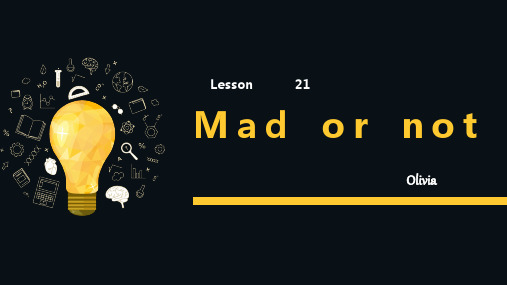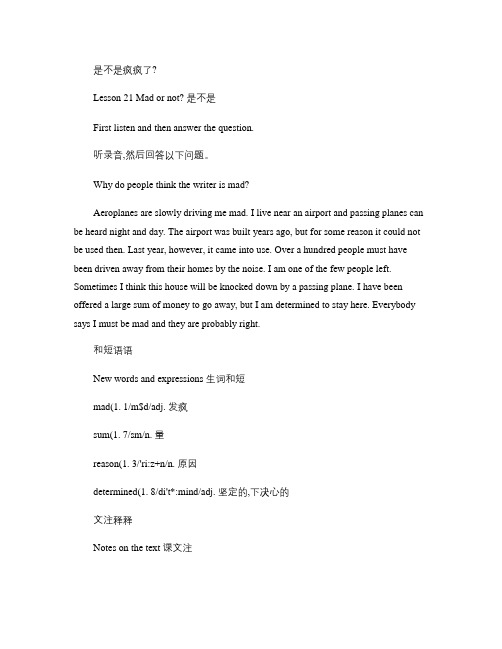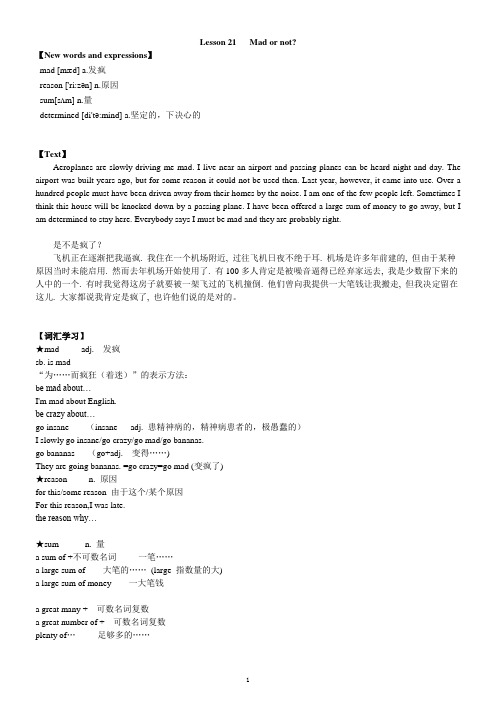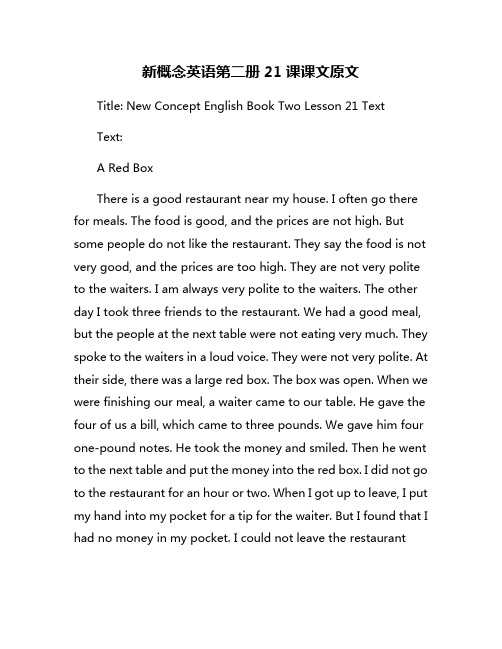(完整版)新概念英语第二册学生用书Lesson21.
新概念第二册第21课课件PPT Lesson21

there
life a long time ago.
A.must be been
D.could be
knock sb down&knock sth down 她被公交车撞到了 She was knocked down by a bus These old houses will be knocked down 我撞到了一个小孩
drive()驱使,逼迫
drive sb to do=make sb. doHunger drove her to steal
这次经历驱使我学德语
drive sb +adi The noise drives me crazy
考试逼得我很紧张
doing+名词 (主动+进行) falling leaves developing country 一张笑脸 一辆正在疾驰的车
C.might put
D.might have put
Don’t be so worried about that. John A. may leave B. must leave C. could have left D. can have left
a note.
Although there is no life on Mars (火星) now, some scientists think that
(上海27) It
have been Tom that parked the car here,
because he is the only one with a car.
A.may
B. can
C. must
D. should
(天津6)She
新概念英语第二册学生用书Lesson21.

是不是疯疯了?Lesson 21 Mad or not? 是不是First listen and then answer the question.听录音,然后回答以下问题。
Why do people think the writer is mad?Aeroplanes are slowly driving me mad. I live near an airport and passing planes can be heard night and day. The airport was built years ago, but for some reason it could not be used then. Last year, however, it came into use. Over a hundred people must have been driven away from their homes by the noise. I am one of the few people left. Sometimes I think this house will be knocked down by a passing plane. I have been offered a large sum of money to go away, but I am determined to stay here. Everybody says I must be mad and they are probably right.和短语语New words and expressions 生词和短mad(1. 1/m$d/adj. 发疯sum(1. 7/sm/n. 量reason(1. 3/'ri:z+n/n. 原因determined(1. 8/di't*:mind/adj. 坚定的,下决心的文注释释Notes on the text 课文注1 Aeroplanes are slowly driving me mad.飞机正在逐渐把我逼疯。
完整版新概念英语第二册学生用书Lesson21

是不是疯疯了?Lesson 21 Mad or not? 是不是First listen and then answer the question.听录音,然后回答以下问题。
Why do people think the writer is mad?Aeroplanes are slowly driving me mad. I live near an airport and passing planes can be heard night and day. The airport was built years ago, but for some reason it could notbe used then. Last year, however, it came into use. Over a hundred people must have been driven away from their homes by the noise. I am one of the few people left. Sometimes I think this house will be knocked down by a passing plane. I have been offered a large sum of money to go away, but I am determined to stay here. Everybodysays I must be mad and they are probably right.和短语语New words and expressions 生词和短mad(1. 1/m$d/adj. 发疯sum(1. 7/sm/n. 量reason(1. 3/'ri:z+n/n. 原因determined(1. 8/di't*:mind/adj. 坚定的,下决心的文注释释课文注Notes on the text1 Aeroplanes are slowly driving me mad.飞机正在逐渐把我逼疯。
新概念英语二Lesson21——Mad or not课件

adj.发疯的 n.理由 n.量 adj.下定决心的
Summary Writing(L21)
• Is the writer slowly going mad or not? • The writer is slowly going mad. • Where does he live? • He lives near an airport. • What can be heard night and day? • Passing planes can be heard night and day. • Have most of his neighbours left their homes or not? • Most of his neighbours have left their homes.
词性转换
Mad or not?
1.Aeroplanes are slowly driving me mad. mad=crazy
2.I live near an airport and passing planes can be heard night and day.
3.The airport was built years ago, but for some reason it could not be used then.
['desɪbel]
80 分贝 嘈杂的办公室、高速公路上的声音
75 分贝 人体耳朵舒适度上限
70 分贝 街道环境声音
50 分贝 正常交谈声音
20 分贝 窃窃私语
New Words of L21
mad reason sum determined
[mæd] ['riːz(ə)n] [sʌm] [dɪ'tɜːmɪnd]
(完整版)新概念英语2Lesson21

Lesson 21 Mad or not?【New words and expressions】mad [mæd] a.发疯reason ['ri:zən] n.原因sum[sʌm] n.量determined [di'tə:mind] a.坚定的,下决心的【Text】Aeroplanes are slowly driving me mad. I live near an airport and passing planes can be heard night and day. The airport was built years ago, but for some reason it could not be used then. Last year, however, it came into use. Over a hundred people must have been driven away from their homes by the noise. I am one of the few people left. Sometimes I think this house will be knocked down by a passing plane. I have been offered a large sum of money to go away, but I am determined to stay here. Everybody says I must be mad and they are probably right.是不是疯了?飞机正在逐渐把我逼疯. 我住在一个机场附近, 过往飞机日夜不绝于耳. 机场是许多年前建的, 但由于某种原因当时未能启用. 然而去年机场开始使用了. 有100多人肯定是被噪音逼得已经弃家远去, 我是少数留下来的人中的一个. 有时我觉得这房子就要被一架飞过的飞机撞倒. 他们曾向我提供一大笔钱让我搬走, 但我决定留在这儿. 大家都说我肯定是疯了, 也许他们说的是对的。
新概念英语第二册学生用书Lesson21.(最新整理)

是不是疯疯了?Lesson 21 Mad or not? 是不是First listen and then answer the question.听录音,然后回答以下问题。
Why do people think the writer is mad?Aeroplanes are slowly driving me mad. I live near an airport and passing planes can be heard night and day. The airport was built years ago, but for some reason it could not be used then. Last year, however, it came into use. Over a hundred people must have been driven away from their homes by the noise. I am one of the few people left. Sometimes I think this house will be knocked down by a passing plane. I have been offered a large sum of money to go away, but I am determined to stay here. Everybody says I must be mad and they are probably right.和短语语New words and expressions 生词和短mad(1. 1/m$d/adj. 发疯sum(1. 7/sm/n. 量reason(1. 3/'ri:z+n/n. 原因determined(1. 8/di't*:mind/adj. 坚定的,下决心的文注释释Notes on the text 课文注1 Aeroplanes are slowly driving me mad.飞机正在逐渐把我逼疯。
新概念第二册Lesson 21 Mad or Not

Calm down and be reasonable 冷静下来,理智一点
a sum of 不可数名词 a large sum of
一笔……
大笔的…… (large 指数量的大)
a large sum of money 一笔巨款 a great many 可数名词复数 a great number of 可数名词复数 plenty of… 足够多的……
Aeroplanes are slowly driving me mad. drive v. He drives his car very badly. 他开车技术非常糟糕。 The farmer drove the cattle in the field. 那位农夫把牛赶进田里。
Our army drove the enemy back. 我们的军队把敌人赶回去了。
Mad adj. 发疯
Reason n. 原因
Sum n. 量 Determined adj. 坚定的,下决心的
Be mad (强调状态)go mad (强调转变) be mad/crazy about sth. 为…而疯狂,狂热地… He’s mad about football. go insane = go crazy = go ape = go nuts = go bananas lunatic/lunacy; hysteria/hysterical; irrational;unreasonable Mental problem, psycho, madman Mental hospital, asylum, man house
Brevity is the soul of wit. 言以简为贵。
新概念英语第二册21课课文原文

新概念英语第二册21课课文原文Title: New Concept English Book Two Lesson 21 TextText:A Red BoxThere is a good restaurant near my house. I often go there for meals. The food is good, and the prices are not high. But some people do not like the restaurant. They say the food is not very good, and the prices are too high. They are not very polite to the waiters. I am always very polite to the waiters. The other day I took three friends to the restaurant. We had a good meal, but the people at the next table were not eating very much. They spoke to the waiters in a loud voice. They were not very polite. At their side, there was a large red box. The box was open. When we were finishing our meal, a waiter came to our table. He gave the four of us a bill, which came to three pounds. We gave him four one-pound notes. He took the money and smiled. Then he went to the next table and put the money into the red box. I did not go to the restaurant for an hour or two. When I got up to leave, I put my hand into my pocket for a tip for the waiter. But I found that I had no money in my pocket. I could not leave the restaurantwithout giving the waiter a tip. So I took a piece of paper and wrote on it: 'You are very polite'. Then I put this into the red box.Word Count: 212End of Text.。
- 1、下载文档前请自行甄别文档内容的完整性,平台不提供额外的编辑、内容补充、找答案等附加服务。
- 2、"仅部分预览"的文档,不可在线预览部分如存在完整性等问题,可反馈申请退款(可完整预览的文档不适用该条件!)。
- 3、如文档侵犯您的权益,请联系客服反馈,我们会尽快为您处理(人工客服工作时间:9:00-18:30)。
是不是疯疯了?Lesson 21 Mad or not? 是不是First listen and then answer the question.听录音,然后回答以下问题。
Why do people think the writer is mad?Aeroplanes are slowly driving me mad. I live near an airport and passing planes can be heard night and day. The airport was built years ago, but for some reason it could not be used then. Last year, however, it came into use. Over a hundred people must have been driven away from their homes by the noise. I am one of the few people left. Sometimes I think this house will be knocked down by a passing plane. I have been offered a large sum of money to go away, but I am determined to stay here. Everybody says I must be mad and they are probably right.和短语语New words and expressions 生词和短mad(1. 1/m$d/adj. 发疯sum(1. 7/sm/n. 量reason(1. 3/'ri:z+n/n. 原因determined(1. 8/di't*:mind/adj. 坚定的,下决心的文注释释Notes on the text 课文注1 Aeroplanes are slowly driving me mad.飞机正在逐渐把我逼疯。
drive someone mad,逼疯。
2 passing planes can be heard night and day,过往飞机日夜不绝于耳。
在句中passing用来修饰名词planes,起形容词作用,是一个现在分词。
3 came into use,启用。
4 Over a hundred people must have been driven away from their homes by the noise.有100多人肯定是被噪音逼得离家远去。
情态动词must+完成时态,是对过去事情的推测,猜测某一事情肯定已经发生。
drive away,赶走,逼走。
参考译文飞机正在逐渐把我逼疯。
我住在一个机场附近,过往飞机日夜不绝于耳。
机场是许多年前建的,但由于某种原因当时未能启用。
然而去年机场开始使用了。
有100多人肯定是被噪音逼得已经弃家远去,我是少数留下来的人中的一个。
有时我觉得这房子就要被一架飞过的飞机撞倒。
他们曾向我提供一大笔钱让我搬走,但我决定留在这儿。
大家都说我肯定是疯了,也许他们说的是对的。
摘要写写作Summary writing 摘要Answer these questions in not more than 50 words.回答下列问题,将答案组成一个段落,不要超过50个单词。
1 Is the writer slowly going mad or not?2 Where does he live?3 What can be heard night and day?4 Have most of his neighbours left their homes or not?5 Has he been offered money to leave or not?6 What is he determined to do?7 What does everyone say?8 Are they probably right or wrong?句型关键句型Key structures关键句型Passing planes can be heard night and day. 被动语态 (KS10 (参见第10课关键句型a Read these pairs of sentences carefully. The first sentence in each pair tells us about a person (Who. The second tells us about a thing (What or Which.仔细阅读以下句子,每一对中的第1句以人为主(谁,第2句以物品为主(什么,哪一件。
He will repair your watch. (Who 他会修理你的表。
Your watch will be repaired. (What 你的表会修好的。
He can repair your watch. (Who 他能修你的表。
Your watch can be repaired. (What 你的表能修好。
They must test this new car. (Who 他们必须试试这辆新车。
This new car must be tested. (What 这辆新车必须试一试。
You have to write this letter again. (Who 你必须重写这封信。
This letter has to be written again. (What 这封信必须重写。
I told you he could do it. (Who 我告诉你他能做。
I told you it could be done. (What 我告诉你这件事能做。
I told you he would do it. (Who 我告诉你他会做这件事。
I told you it would be done. (What 我告诉你这件事会干好的。
I can't find my bag. Someone has stolen it. (Who 我找不到我的提包。
有人偷走了。
I can't find my bag. It has been stolen. (What 我找不到我的提包。
它被偷走了。
I can't find my bag. Someone must have stolen it. (Who 我找不到我的提包。
有人肯定把它偷走了。
I can't find my bag. It must have been stolen. (What 我找不到我的提包。
它肯定被人偷走了。
Exercises 练习练习A There are some verbs in the passage which are like the examples given above. Can you find them?找出课文中所有被动语的例子。
B Change the form of the phrases in italics. Do not refer to the passage until you finish the exercise.将斜体印出的部分改写成被动语态,完成练习后再对照课文核对你的答案。
b Instead of saying: We can say:除了这种表述方法外: 还可以说The police will arrest the thieves. The thieves will be arrested (bythe police.You must pay me for this.I must be paid for this.They cannot find him. He cannot be found.I live near an airport and I can hear passing planes night and day. They built the airport years ago, but for some reason they could not use it then. Last year, however, it came into use. The noise must have driven over a hundred people away from their homes.I am one of the few people left. Sometimes I think a passing plane will knock down this house. They have offered me a large sum of money to go away, but I am determined to stay here.C Change the form of these sentences. Your sentences must begin with the words in italics.改写以下句子,将斜体印出的词和词组作主语。
1 I will send a message immediately.2 We must sell all these goods.3 I told you he would receive the parcel in time.4 He has to deliver the letter by hand.5 They must have lost your letter in the post.Special difficulties难点Words often confused and misused经常容易混淆和误用的词Study these examples:细读以下例句:a Drive. This verb can be used in many ways. 这个动词的词义很多Aeroplanes are slowly driving me mad. (1. 1He drives his car very badly. 他开车开得很糟糕。
The farmer drove the cattle into the field. 农夫把牛赶进田里。
Our army drove the enemy back. 我们的军队把敌人撵了回去。
During the war, many people were driven out of their homes. 战争期间,许多人被赶出了家园。
